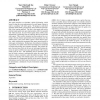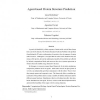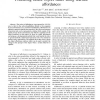448 search results - page 8 / 90 » Abstraction in Predictive State Representations |
119
click to vote
ATAL
2010
Springer
15 years 2 months ago
2010
Springer
This paper describes an algorithm, called CQ-learning, which learns to adapt the state representation for multi-agent systems in order to coordinate with other agents. We propose ...
110
click to vote
ECAI
2000
Springer
15 years 5 months ago
2000
Springer
Abstract. We propose a very general syntactical notion of epistemic state and a compact axiomatization for iterated revision when the new information is an epistemic state. We set ...
126
click to vote
MAGS
2007
15 years 1 months ago
2007
A protein is identified by a finite sequence of amino acids, each of them chosen from a set of 20 elements. The Protein Structure Prediction Problem is the problem of predicting...
133
click to vote
CORR
2010
Springer
15 years 2 days ago
2010
Springer
We propose a new approach to value function approximation which combines linear temporal difference reinforcement learning with subspace identification. In practical applications...
107
click to vote
ISCIS
2009
Springer
15 years 8 months ago
2009
Springer
Abstract—The notion of affordances was proposed by J.J. Gibson, to refer to the action possibilities offered to the organism by its environment. In a previous formalization, affo...



